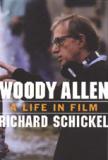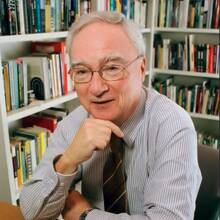Through an Urban Lens
Woody Allen has never been in the Spielberg or Lucas class of popularity with American audiences, yet the critical literature surrounding the artist and his work continues to grow beyond any correlation to his box-office numbers. With the possible exception of Hitchcock, Allen may be the most scrutinized director in film history.
Richard Schickel, best known to the general public as the longtime film reviewer for Time and to scholars for his definitive biography of D. W. Griffith, adds a breezy, readable entry to Allen’s vast bibliography, and in a thoughtful Afterword attempts to address head-on the paradox of Allen’s popularity with critics and lukewarm reception by the ticket-buying public in the United States. His films, Schickel tells us, tend to edge marginally into the black solely on the basis of European distribution and video rentals.
The name and bespectacled image of the artist suggest many verbal associations: comedy, New York, Jewish. Yet, as Schickel argues, the films belie the reputation. They’re really not very funny by the standards of American blockbuster comedies directed to adolescent audiences. The films are set in New York, but could as easily describe the plight of urbanites anywhere. The main characters frequently have Jewish names, but he seldom deals with Jewish material, as did an earlier generation of “Borscht-Belt” comics, like Henny Youngman and Myron Cohen. Schickel calls this failure to connect with a wide audience a case of “misdirection.” Preconceptions “direct” viewers to a neatly defined set of expectations, which Allen consistently fails to meet.
As a result, Allen’s films have been shunted off to college classrooms, film festivals and art house retrospectives, where his reputation as America’s foremost filmmaker continues to grow. In his lengthy Introduction, Schickel provides an insightful survey of Allen’s work as a whole, the kind of thing that film scholars do for a living. At the heart of the films lies a sense of what he calls “magic realism.” In a world without God or community traditions, modern urbanites succeed in finding happiness, if they do, only by a mysterious intervention of something like art, imagination or dumb luck. Often enough, the magic fades quickly. Romance comes on with a rush, and then evaporates; celebrity, success and peer recognition, sought with obsession, pass without a trace. Some people have all the luck, talent and good genes; others none at all. The only possible response can be a joke, an ironic comment on the absurdity of life.
As a chronicler of urban life, Allen directs his satire at the people he knows best. He remains the boy from Brooklyn, who looks at sophisticated Manhattanites with a mixture of awe, envy and resentment. Now that he lives among them, he knows their hollowness first hand. For a time, sophisticated New Yorkers appreciated the satire he aimed in their direction and provided his core audience. But as Schickel points out, even though these people have won the culture wars, they feel besieged by the compassionate conservatives who have won the political wars. In the present climate, these aging liberals find less to laugh about. As a result, Allen’s recent films have become more strained and even less popular. Europeans, however, continue to laugh at the shallow pretensions of Americans, and they can still enjoy Allen’s take on contemporary society.
The core of the book consists of a transcription of a lengthy interview—conversation would be a more appropriate term—between Allen and Schickel, as they prepared a documentary on Allen’s work for Turner Network Television. Allen’s own words provide the raw material for Schickel’s excellent Introduction and Afterword. Again the question of misdirection arises for readers as it does for film audiences. One might expect a long discussion with Woody Allen to be a verbal “laff-riot,” like some of his brilliant pieces for The New Yorker. Instead one finds a thoughtful artist in his late 60’s looking back over his life and work with more regret than satisfaction.
Allen’s comments are at times pedestrian and rarely reveal anything new for those who have followed his career in any detail, but they are his own words, not the fever dreams of critics trying to make sense out of his unique contribution to contemporary film. A college dropout, he intended to be a writer, and was extremely successful at it, but gradually branched out into performance and direction. He still maintains the primacy of script—words, characters and ideas—and this alone puts him outside the American mainstream. To this day he would prefer to have been a serious playwright than a filmmaker, even though he realizes that old films are part of his artistic heritage. He stands in awe of Bob Hope and Groucho Marx, and compares Buster Keaton to Charlie Chaplin with the critical acumen worthy of a film textbook.
Although he rejects the title “workaholic,” Allen has created a film each year for over 30 years. Most of these he dismisses as failures due to his own lack of talent or laziness as a director. Does this mask his own perfectionism or insecurity, or is he just fishing? At one point, his self-deprecation drives Schickel to an exasperated vulgarism: “I think you have made at least a half-dozen of the great movies of the postwar years. So I think you’re full of.....on this” So do I, so I’m grateful for one more perspective on what makes the man tick.
This article also appeared in print, under the headline “Through an Urban Lens,” in the October 13, 2003, issue.








